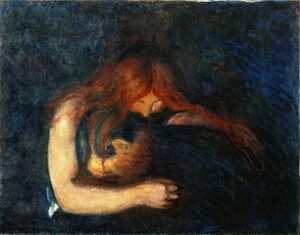This is Faith in Play #28: Vampires, for March 2020.
When Tim Brown suggested I explore the subject of the undead, I was, I think the word is, nonplussed. Maybe that’s too strong a word–but I’ve never really been a fan of the undead generally, and I find that they are very popular in popular culture in forms I don’t find particularly appealing.

Part of that, though, is that they’ve lost their original significance. The undead are metaphors for humanity against God. Our modern world has found godless scientific explanations for them–zombies, for example, are living people infected with a virus or a drug. The metaphor is if not gone at least buried, altered drastically. This is particularly true for the vampire.
I’ve seen a few vampire movies, and always been disappointed. I enjoyed Stoker’s book mostly for the writing style, the use of diaries and letters and newspaper articles to tell the story, interspersed with only occasional narrative. But the vampire is a metaphor for a life turned against God–perhaps the reason why some of the best modern vampire stories claim that the original vampire was not Vlad Dracula but Judas Iscariot, or Cain son of Eve. It gets its powers from the devil, from its devotion to evil.
Take the silly notion that a vampire could go out in the sun if he wore Ultraviolet Protection Factor 100 sunscreen–as if it were the ultraviolet light that mattered. God created the light, and divided it from the darkness, and called the light day and the darkness night. He made the sun to rule the day, the time when the world is filled with light. Vampires cannot go out in the day because they are creatures of darkness, and the sun who rules the day would destroy them with the light.
Gary Gygax got it right. In the original Advanced Dungeons & Dragons™ Monster Manual he wrote
Vampires recoil from strong garlic, the face of a mirror, or a cross (or several other holy symbols of lawful good).
It is perhaps peculiar that even in a universe in which Christianity did not exist its prime symbol was still potent against vampires, because they are ultimately creatures of evil. Interestingly one way to kill a vampire is to baptize it–to immerse it in cold running water, the method of baptism recommended in The Didache (The Teaching of the Twelve Apostles, second century record of church practice). It is the power of God and of trust, faith, belief in God that destroys creatures of evil, and vampires are a wonderful metaphor for this.
I admit that I don’t much care for undead as they are portrayed in modern movies and television and books (what’s with that sparkling?) However, I use them in my fantasy games, largely because they make decent enemies for my player characters and they fit in scenarios involving tombs, catacombs, crypts, or graveyards. However, in writing Verse Three, Chapter One: The First Multiverser Novel I used vampires as the enemy for one of my protagonists, and brought her back to that world to face vampires again in Old Verses New and finally in For Better or Verse. Her stand against the vampires showcased her faith in a powerful way, both in the action of the story and in the literary presentation of it. Vampires, used rightly, can be a powerful tool for highlighting the power of God.
So I’m recommending the use of the undead in your games, as metaphors for the godless and those who have turned against God. One of the most potent aspects of fantasy role playing games is their ability to pit the players against the powers of darkness and force their characters to rely on the power of the divine.
Previous article: Believing Balance.
Next article: Victims.

I think the Twilight novels work at least a little better if you replace ‘vampire’ with ‘fae.’ Creatures of Faerie are permitted to sparkle, to have melodramatic romantic entanglements, and some of them do still drink blood.
While I generally agree that modern vampire stories lack theological weight, there’s still some good story to be had there. The TV shows Buffy the Vampire Slayer and Angel, for instance, explored some interesting themes with the ‘good’ vampires Angel and Spike. Is evil purely a matter of what we do, or is it who we are? If we change, how much responsibility do we still bear for the sins of the past? How do we learn to forgive those who have done us harm? How do we relate to them after they’ve been regenerated?
White Wolf games, played properly, present us with the dilemma of learning to live in a state where everything we do to survive makes us a little more monstrous. How do we live in this fallen world without allowing it to taint us? Granted, I’ve not encountered many players who really Embrace that theme, but it’s there and, in my opinion, foundational to the game.
It’s true that these aren’t stories about the dichotomy of good and evil that earlier vampire myths gave us, but that doesn’t mean the modern takes are devoid of meaning useful to Christians.
#426: A Christian View of Horror | mark Joseph "young"
[…] horror can be used for edifying purposes. I more recently observed in Faith in Play #28: Vampires that the undead, used well, were an excellent metaphor for lost humanity. The story of […]